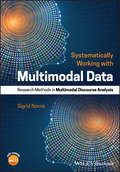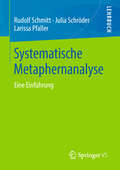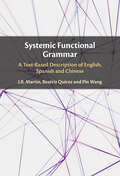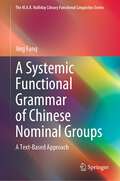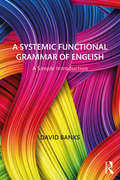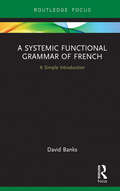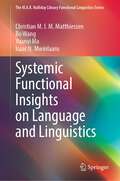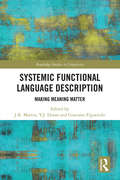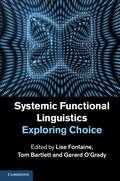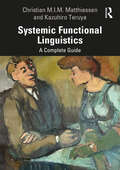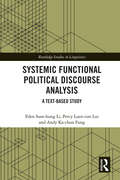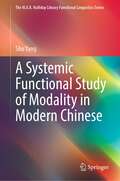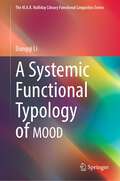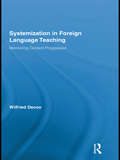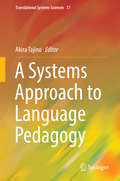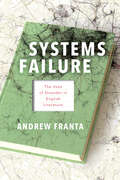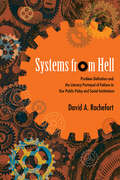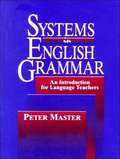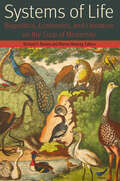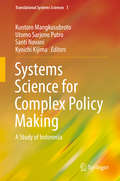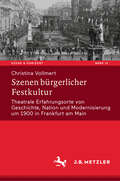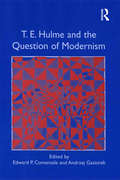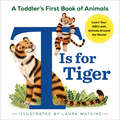- Table View
- List View
Systematically Working with Multimodal Data: Research Methods in Multimodal Discourse Analysis
by Sigrid NorrisA guide that offers a step-by-step process to data-driven qualitative multimodal discourse analysis Systematically Working with Multimodal Data is a hands-on guide that is theoretically grounded and offers a step-by-step process to clearly show how to do a data-driven qualitative Multimodal Discourse Analysis (MDA). This full-color introductory textbook is filled with helpful definitions, notes, discussion points and tasks. With illustrative research examples from YouTube, an Experimental and a Video Ethnographic Study, the text offers many examples of how to deal with small to large amounts of data, including information on how to transcribe video data multimodally, including online videos, and how to analyze the data. This textbook contains ample theory, directions for literature, and a teaching guide to help with a clear understanding of how to work with multimodal data. Contains new research data, exceptional illustrations and diagrams Offers step-by-step processes of working through examples, transcriptions and online videos Goes into great depth so that students can use the book as hands-on material to engage with their own data analysis Designed to be easy-to-use with color-coded definitions, tasks, discussion points and notes Written for advanced undergraduate, graduate and PhD level students, as well as participants in research workshops, Systematically Working with Multimodal Data is an authoritative guide to understanding data-driven qualitative Multimodal Discourse Analysis.
Systematische Metaphernanalyse: Eine Einführung
by Rudolf Schmitt Julia Schröder Larissa PfallerDie Analyse von Metaphern hat sich als neuer Weg zu den Deutungen entwickelt, in denen Menschen sich und ihre Welt begreifen. Dieses Lehrbuch führt in den am weitesten entwickelten Metaphernbegriff der kognitiven Linguistik ein und skizziert eine Methode für verlässliche Rekonstruktion der metaphorischen Konstruktionen von Selbst und Welt.
Systemic Functional Grammar: A Text-Based Description of English, Spanish and Chinese
by J.R. Martin Beatriz Quiroz Pin WangSystemic Functional Linguistics (SFL) is a usage-based theory of language, founded on the assumption that language is shaped entirely by its various functions in the contexts in which it used. The first of its kind, this book advances SFL by applying it comparatively to English, Spanish and Chinese. By analysing English alongside two other, typologically very different major world languages, it shows how SFL can effectively address two central issues in linguistics – namely typology and universals. It concentrates in particular on argumentation, carefully explaining how descriptions of nominal group, verbal group and clause systems and structures are motivated, and draws on examples from key texts which display a full range of ideational, interpersonal and textual grammar resources. By working across three world languages from a text-based perspective, and demonstrating how grammar descriptions can be developed and improved, the book establishes the foundations for a groundbreaking functional approach to language typology.
A Systemic Functional Grammar of Chinese Nominal Groups: A Text-Based Approach (The M.A.K. Halliday Library Functional Linguistics Series)
by Jing FangThis book describes the grammar of Chinese nominal groups for the purpose of text analysis, drawing upon Halliday’s systemic functional linguistics (SFL) model. Exploring the metafunctional grammatical resources in nominal groups, the book provides a new perspective on conducting text analysis by focusing on the metafunctions performed by various elements in the nominal group. The observations on nominal groups presented here are based on both a working corpus of 180 texts of various types and a large referential corpus of over 16 billion tokens. With clear descriptions of the terminology used, the book presents a case study at the end of each major chapter, which demonstrates how the grammatical resources discussed can be applied to the delicate analysis of authentic texts. This monograph is more than a grammar book, for it offers a new way to engage with a text microscopically and enables readers to approach and analyse a text by focusing on grammatical units below the clause level. The book provides an accessible and valuable resource for readers who are interested in SFL-based typological description, text analysis, translation studies between English and Chinese, English–Chinese comparative linguistic studies, and Chinese language teaching and learning.
A Systemic Functional Grammar of English: A Simple Introduction
by David BanksProviding a simple – but not simplistic – introduction to the Systemic Functional Grammar (SFG) of English, this book serves as a launching pad for the beginning student and a review for the more seasoned linguist. <p><p>With an introduction to SFG through lexicogrammar and the concept of rankshift, this book is the first introduction to SFG (including Appraisal) with examples exclusively sourced from twenty-first century texts. <p><P>Written for those learning English and English linguistics as a foreign language, this serves as an easy-to-read introduction or refresher course for Systemic Functional Linguistics.
A Systemic Functional Grammar of French: A Simple Introduction
by David BanksA Systemic Functional Grammar of French provides an accessible introduction to systemic functional linguistics through French. This concise introduction to the systemic functional grammar (SFG) framework provides illustrations throughout that highlight how the framework can be used to analyse authentic language texts. This will be of interest to students in alternative linguistic frameworks who wish to acquire a basic understanding of SFG as well as academics in related areas, such as literary and cultural studies, interested in seeing how SFG can be applied to their fields.
Systemic Functional Insights on Language and Linguistics (The M.A.K. Halliday Library Functional Linguistics Series)
by Christian M.I.M. Matthiessen Bo Wang Yuanyi Ma Isaac N. MwinlaaruThis book features a collection of 10 interviews with Christian M.I.M. Matthiessen, who is a key figure in Systemic Functional Linguistics (SFL) and has collaborated closely with M.A.K. Halliday since the 1980s. As noted by Professor Chang Chenguang, Editor of the M.A.K. Halliday Library Functional Linguistics Series, “this collection of interviews serves as an important reference for scholars and students of SFL. It provides a unique perspective on the theoretical development and future outlooks of SFL, as well as Matthiessen’s own interpretations of the theory. It also enriches our understanding of SFL and is a very useful addition to the series.” Written in an engaging dialogic format, the book paints a vivid picture of SFL thriving among the landscape of general linguistics and of SFL as an important tool now being applied in various areas.
Systemic Functional Language Description: Making Meaning Matter (Routledge Studies in Linguistics)
by J. R. Martin Y. J. Doran Giacomo FigueredoThis volume showcases previously unpublished research on theoretical, descriptive, and methodological innovations for understanding language patterns grounded in a Systemic Functional Linguistic perspective. Featuring contributions from an international range of scholars, the book demonstrates how advances in SFL have developed to reflect the breadth of variation in language and how descriptive methodologies for language have evolved in turn. Taken together, the volume offers a comprehensive account of Systemic Functional Language description, providing a foundation for practice and further research for students and scholars in descriptive linguistics, SFL, and theoretical linguistics.
Systemic Functional Linguistics
by Lise Fontaine Tom Bartlett Gerard O'Grady Lise Fontaine Tom BartlettThis stimulating volume provides fresh perspectives on choice, a key notion in systemic functional linguistics. Bringing together a global team of well-established and up-and-coming systemic functional linguists, it shows how the different senses of choice as process and as product are interdependent, and how they operate at all levels of language. Taking an interdisciplinary approach, it covers a range of linguistic viewpoints, informed by evolutionary theory, psychology, sociology and neuroscience, to produce a complex but unifying account of the issues. This book offers a critical examination of choice and is ideal for students and researchers working in all areas of functional linguistics as well as cognitive linguistics, second language acquisition, neurolinguistics and sociolinguistics.
Systemic Functional Linguistics: A Complete Guide
by Christian Matthiessen Kazuhiro TeruyaThis user-friendly student guide is the essential resource for all those engaged in studying systemic functional linguistics (SFL). Assuming no prior knowledge, this guide is divided into nine chapters which can be read independently of one another and used for purposes of reference. The reading section maps out and mediates the key SFL literature. The application guides show how SFL has been and can be applied to various domains, from translation to healthcare communication. The term guides demystify the core terminology and the vocabulary guides aid readers in dealing with the most commonly used terms in text analysis. Systemic Functional Linguistics is an invaluable guidebook for all those studying functional grammar and SFL within linguistics, applied linguistics and related courses.
Systemic Functional Political Discourse Analysis: A Text-based Study (Routledge Studies in Linguistics)
by Eden Sum-hung Li Percy Luen-tim Lui Andy Ka-chun FungSystemic Functional Political Discourse Analysis: A Text-based Study is the first book which takes a comprehensive systemic functional perspective on political discourse to provide a complete, integrated, exhaustive, systemic and functional description and analysis. Based on the political discourses of the Umbrella Movement – the largest public protest in the history of Hong Kong, which occupies a unique political situation in the world: a post-colonial society like many other Asian societies and yet unlike the others, it is a Special Administrative Region of China. Though it enjoys a high degree of autonomy under the principle of ‘One Country, Two Systems’, it is still confined to being part of the ‘One Country’. The book demonstrates how a systemic functional approach can provide a comprehensive, thorough, and insightful analysis of the political discourse from four co-related and complementary approaches: contextual, discourse semantic, lexicogrammatical and historical. Apart from a thorough discussion of various systemic functional conceptions, it provides examples of various analyses from a SF perspective, including contextual parameters, registerial analysis, semantic discourse analysis, appraisal analysis, and discusses important issues in political discourse, including negotiation of self-identity, association of language, power and institutional role, and expression of ‘evidentiality’ and ‘subjectivity’. It is written not only for those who are interested in Hong Kong politics in general and political discourse in Hong Kong in particular, but also for those who work on political discourse analysis, and those who apply SFL to various other discourses such as mass media discourse, medical discourse, teaching discourse, etc. Last but not least, this book is also intended to provide a theoretical framework in discourse analysis from the systemic functional perspective for those who work in Cantonese and in other languages.
A Systemic Functional Study of Modality in Modern Chinese (The M.A.K. Halliday Library Functional Linguistics Series)
by Shu YangThis book presents a systematic and relatively comprehensive account of the system of MODALITY in Modern Chinese and the functions that realizations of modality serve in the clause and clause complex. Grounded in SFL, the research begins by introducing the system of types of modality in Modern Chinese, investigating the subtypes of modality and their realizations. The study then explores the systems of Orientations that characterize the realization of modalization and modulation in Chinese. After establishing the complete system of modality in Modern Chinese, the research finally examines the functions that realizations of modality serve in the textual structure of the clause and in the clause complex. The study finds that the system of MODALITY is an important interpersonal clause system at the lexicogrammatical stratum of Chinese. There are two distinct types of modality in Chinese: modalization and modulation. Modalization concerns the assessment of probability of the proposition; modulation is concerned with the assessment of the proposal in terms of obligation, inclination, and ability. The systems of ORIENTATIONS make a basic distinction between subjective and objective modality, and between the explicit and implicit realizations. The research also reveals that in the thematic structure of the clause, realizations of modality can serve as the interpersonal Theme in the clause, in the information structure of the clause, realizations of modality can function as the unmarked information focus of the clause or introduce the marked information focus, and in the clause complex, realizations of modality can encode modal meanings and simultaneously construct clauses into a clause complex.
A Systemic Functional Typology of MOOD (The M.A.K. Halliday Library Functional Linguistics Series)
by Dongqi LiThe grammatical category of (sentence) mood has been of central interest to many branches of linguistics, including linguistic typology and systemic functional linguistics. This book is a successful integration of the typological and systemic functional approaches to mood, aiming to investigate the commonalities and variations across languages in both mood system and mood structure. To this aim, it establishes a geographically, genetically and typologically representative sample of 60 languages and provides detailed systemic functional descriptions of the mood system and mood structure of these languages. Based on such descriptions, it makes cross-linguistic comparisons of the mood system and mood structure of the languages in the sample. Structurally, it explores the cross-linguistic commonalities and variations in (i) the realizations of some major functional elements in mood structure, (ii) the realizations of mood options and (iii) the realizations of mood system. Systemically, it investigates how languages resemble and vary from each other in (i) the subtypes of major mood types, (ii) the organization of mood system and (iii) the semantic dimensions along which mood system is elaborated further in delicacy. Moreover, building on the descriptions and comparisons, it makes some generalizations about the structural and systemic features of mood and proposes some tentative explanations for the commonalities and variations languages display in mood system and mood structure. This book is an empirical and holistic approach to the typology of mood and contributes to a deeper understanding of the grammatical category. It is of special interest to systemic functional linguists, typologists, grammarians and descriptive linguists.
Systemization in Foreign Language Teaching: Monitoring Content Progression (Routledge Research in Education)
by Wilfried DecooForeign language learning is a progressive endeavor. Whatever the method, the learner should advance from one point to another, constantly improving. Growing proficiency entails growing language content. Content is complex, displaying many dimensions. Syllabus designers, textbook authors, and teachers often struggle with the monitoring of content. Computer-assisted systemization helps to handle it in a manageable framework. Besides inventorying content, it ensures more balanced selections, calculated progression, and controlled reiteration of previously learned material. It gauges the usability of authentic material in relation to the level attained. During the teaching process, it allows the instant selection of items needed for a communicative situation, focus on forms, or particular exercises. This book first describes the theoretical background for systemization, including a historical overview, with special attention to the Common European Framework and the new Profiles and Referentials. Next the practical steps for computer-assisted implementation with examples taken from French and English, but applicable to any language.
A Systems Approach to Language Pedagogy (Translational Systems Sciences #17)
by Akira TajinoThis volume represents the first attempt in the field of language pedagogy to apply a systems approach to issues in English language education. In the literature of language education, or more specifically, second or foreign language learning and teaching, each topic or issue has often been dealt with independently, and been treated as an isolated item. Taking grammar instruction as an example, grammatical items are often taught in a sequential, step-by-step manner; there has been no “road map” in which the interrelations between the various items are demonstrated. This may be one factor that makes it more difficult for students to learn the language organically. The topics covered in this volume, including language acquisition, pedagogical grammar, and teacher collaboration, are viewed from a holistic perspective. In other words, language pedagogy is approached as a dynamic system of interrelations. In this way, “emergent properties” are expected to manifest. This book is recommended for anyone involved in language pedagogy, including researchers, teachers, and teacher trainers, as well as learners.
Systems Failure: The Uses of Disorder in English Literature
by Andrew FrantaHow eighteenth-century writers stretched systems designed to explain social relations to their breaking point, showing the flaws in their design.The Enlightenment has long been understood—and often understood itself—as an age of systems. In 1759, Jean Le Rond d'Alembert, one of the architects of the Encyclopédie, claimed that "the true system of the world has been recognized, developed, and perfected." In Systems Failure, Andrew Franta challenges this view by exploring the fascination with failure and obsession with unpredictable social forces in a range of English authors from Samuel Johnson to Jane Austen.Franta argues that attempts to extend the Enlightenment's systematic spirit to the social world prompted many prominent authors to reject the idea that knowledge is synonymous with system. In readings of texts ranging from novels by Sterne, Smollett, Godwin, and Austen to Johnson's literary biographies and De Quincey's periodical essays, Franta shows how writers repeatedly take up civil and cultural institutions designed to rationalize society only to reveal the weaknesses that inevitably undermine their organizational and explanatory power. Diverging from influential accounts of the rise of the novel, Systems Failure audaciously reveals that, in addition to representing individual experience and social reality, the novel was also a vehicle for thinking about how the social world resists attempts to explain or comprehend it. Franta contends that to appreciate the power of systems in the literature of the long eighteenth century, we must pay attention to how often they fail—and how many of them are created for the express purpose of failing. In this unraveling, literature arrives at its most penetrating insights about the structure of social life.
Systems from Hell: Problem Definition and the Literary Portrayal of Failure in Our Public Policy and Social Institutions (SUNY series in New Political Science)
by David A. RochefortThis book approaches contemporary fiction as a medium for policy advocacy, one whose narrative devices both link it to, and distinguish it from, other forms of public discourse. Using the framework of political agenda setting, David A. Rochefort analyzes the rhetorical function of problem definition played by literary works when they document and characterize social issues while sounding the call for systemic reform. Focusing on a group of noteworthy realist novels by American authors over the past twenty years, this study maintains that fictional narrative is a potentially influential instrument of "empathic policy argument." The book closes by examining the agenda-setting dynamics through which a social problem novel can contribute to the process of policy change.
Systems In English Grammar: An Introduction For Language Teachers
by Peter MasterThis book teaches teachers how to present grammar lessons to their students with confidence and clarity. Introduces future teachers of English to the major elements of English grammar in a systematic fashion, using step-by-step procedures, charts, diagrams, and exercises. Includes a complete answer key to exercises.
Systems of Life: Biopolitics, Economics, and Literature on the Cusp of Modernity (Forms of Living)
by Richard A. Barney and Warren MontagSystems of Life offers a wide-ranging revaluation of the emergence of biopolitics in Europe from the mid– eighteenth to the mid–nineteenth century. In staging an encounter among literature, political economy, and the still emergent sciences of life in that historical moment, the essays collected here reopen the question of how concepts of animal, vegetable, and human life, among other biological registers, had an impact on the Enlightenment project of thinking politics and economics as a joint enterprise. The volume’s contributors consider politics, economics, and the biological as distinct, semi-autonomous spheres whose various combinations required inventive, sometimes incomplete, acts of conceptual mediation, philosophical negotiation, disciplinary intervention, or aesthetic representation.
Systems Science for Complex Policy Making: A Study of Indonesia (Translational Systems Sciences #3)
by Kuntoro Mangkusubroto Utomo Sarjono Putro Santi Novani Kyoichi KijimaThis volume applies a systems science perspective to complex policy making dynamics, using the case of Indonesia to illustrate the concepts. Indonesia is an archipelago with a high heterogeneity. Her people consist of 1,340 tribes who are scattered over 17,508 islands. Every region has different natural strengths and conditions. In the national development process all regions depend on one another other while optimizing their own conditions. In addition to this diversity, Indonesia also employs a democratic system of government with high regional autonomy. A democratic government puts a high value on individual freedom, but on the other hand, conflicts of interest also occur frequently. High regional autonomy also often causes problems in coordination among agencies and regional governments. This uniqueness creates a kind of complexity that is rarely found in other countries.These daily complexities requires intensive interaction, negotiation processes, and coordination. Such necessities should be considered in public policy making and in managing the implementation of national development programs. In this context, common theories and best practices generated on the basis of more simplified assumptions often fail. Systems science offer a way of thinking that can take into account and potentially overcome these complexities. However, efforts to apply systems science massively and continuously in real policy making by involving many stakeholders are still rarely carried out. The first part of the book discusses the gap between the existing public policy-making approach and needs in the real world. After that, the characteristics of the appropriate policy-making process in a complex environment and how this process can be carried are described. In later sections, important systems science concepts that can be applied in managing these complexities are discussed. Finally, the efforts to apply these concepts in real cases in Indonesia are described.
Szenen bürgerlicher Festkultur: Theatrale Erfahrungsorte von Geschichte, Nation und Modernisierung um 1900 in Frankfurt am Main (Szene & Horizont. Theaterwissenschaftliche Studien #12)
by Christina VollmertAm Beispiel der Stadt Frankfurt a.M. untersucht die interdisziplinäre Studie anhand dreier Fallstudien das komplexe Verhältnis zwischen gesellschaftlichen, politischen und medienkulturellen Transformationsprozessen und bürgerlicher Festkultur als Ort sozialer Bedeutungskonstruktion. Von historischen Stadt- und Künstlerfesten über politisch aufgeladene Schützenfeste bis hin zu spektakulären Industrie- und Gewerbeausstellungen werden die untersuchten Feste als theatrale Aufführungen verstanden, die die Veränderungen der Modernisierung um 1900 reflektieren und tiefe Einblicke in die soziokulturellen Umbrüche jener Zeit ermöglichen. Das Theatrale als bewusste und demonstrative Betonung des Zur-Schau-Stellens wird in dieser Studie als kulturelle Praxis gedeutet, die als Vermittler in einer Zeit der Umbrüche agieren kann: Indem die analysierten Feste abstrakte und ideologisch aufgeladene Konzepte wie Geschichte, Nation oder Modernisierung im Moment ihrer sinnlichen Zurschaustellung unmittelbar erfahrbar machen, ermöglichen sie eine Teilhabe an einem ästhetischen Erlebnis, das zum Verständnis und zur Akzeptanz der vermittelten Inhalte führen kann. Die Studie eröffnet damit eine neue Perspektiven auf die bislang gängigen Narrative der Kultur- und Modernisierungsgeschichte des 19. Jahrhunderts.
T.E. Hulme and the Question of Modernism
by Andrzej GasiorekThough only 34 years old at the time of his death in 1917, T.E. Hulme had already taken his place at the center of pre-war London's advanced intellectual circles. His work as poet, critic, philosopher, aesthetician, and political theorist helped define several major aesthetic and political movements, including imagism and Vorticism. Despite his influence, however, the man T.S. Eliot described as 'classical, reactionary, and revolutionary' has until very recently been neglected by scholars, and T.E. Hulme and the Question of Modernism is the first essay collection to offer an in-depth exploration of Hulme's thought. While each essay highlights a different aspect of Hulme's work on the overlapping discourses of aesthetics, politics, and philosophy, taken together they demonstrate a shared belief in Hulme's decisive importance to the emergence of modernism and to the many categories that still govern our thinking about it. In addition to the editors, contributors include Todd Avery, Rebecca Beasley, C.D. Blanton, Helen Carr, Paul Edwards, Lee Garver, Jesse Matz, Alan Munton, and Andrew Thacker.
T is for Texas: A Lone Star State ABC Primer
by Trish MadsonTake an alphabetized field trip around the Lone Star State and discover the plants, animals, foods, and places that make it, well, Texas!
T Is for Tiger: A Toddler's First Book of Animals
by Laura WatkinsFrom alligator to zebra—wild animals make learning the alphabet come alive for kids ages 2 to 4 What could be more fun than learning about the alphabet and all sorts of amazing animals at the same time? T Is for Tiger goes beyond other animal books for toddlers and introduces your little one to letters in an simple and fascinating format with colorful illustrations and plenty of critters they'll never forget. Everything animal books for toddlers should be: A worldwide adventure—Discover animals for every letter of the alphabet—even Q and X—as they appear in their natural environments. Engaging and educational—Unlike other animal books for toddlers, T Is for Tiger features realistic illustrations that help your toddler recognize animals and their homes. Go beyond the ABCs—You won't need other animal books for toddlers—revisit the pages and continue the learning as your child grows with animal fun facts, a world map, and more. Teach your little one about letters and animals all at once—from A is for alligator to Z is for zebra. When it comes to animal books for toddlers, this one roars with fun.
T is for Turkey: A True Thanksgiving Story
by Tanya Lee StoneLittle ones will love learning about Thanksgiving in Tanya Lee Stone's newest shaped alphabet book. Join in as the elementary school puts on a play that tells the true story of the first Thanksgiving. Rhyming couplets that flow through the alphabet help kids celebrate everything from Harvest to Pilgrims to Turkey.
